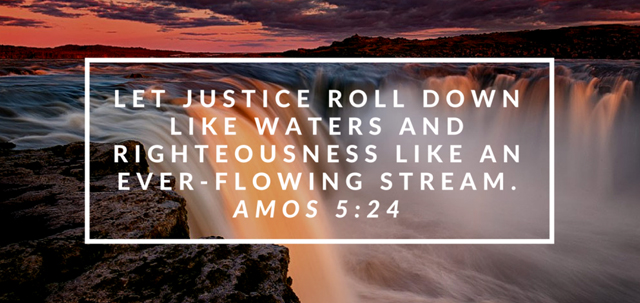Lesson: Amos 5:18-24
Reading
18 Thus says the LORD, the God of hosts, the LORD: Alas for you who desire the day of the LORD! Why do you want the day of the LORD? It is darkness, not light;
19 as if someone fled from a lion and was met by a bear; or went into the house and rested a hand against the wall and was bitten by a snake.
20 Is not the day of the LORD darkness, not light, and gloom with no brightness in it?
21 I hate, I despise your festivals, and I take no delight in your solemn assemblies.
22 Even though you offer me your burnt offerings and grain offerings, I will not accept them;
and the offerings of well-being of your fatted animals I will not look upon.
23 Take away from me the noise of your songs; I will not listen to the melody of your harps.
24 But let justice roll down like waters, and righteousness like an everflowing stream.
Commentary
After Solomon died in 930 BCE, the Kingdom of Israel split into two parts, the North (called Israel with 10 tribes) and the South (called Judea with two tribes). Each of the Kingdoms had its own king.
The reign of King Jeroboam II of Israel (788-747 BCE) was very prosperous, but a time of great inequality between rich and poor in which large landowners gained control of the lands of small farmers.
Amos was a cattle herder and cared for fig trees in Judea, but he was called by YHWH to go north to prophesy (speak for the LORD) against Israel from about 760 to 750 BCE. Amos is one of the 12 “minor” prophets whose works are shorter than the three “major” prophets (Isaiah, Jeremiah, and Ezekiel). He was the first (chronologically) of the prophets whose words left an indelible stamp on later thought in Israel about God.
In today’s reading, YHWH told Israel that the “Day of the LORD/YHWH” will be a time of darkness (v.20), and that instead of empty rituals (vv.20-23), YHWH desired justice and righteousness (v. 24). This was a major reinterpretation of the Day of the LORD and emphasized that Israel would also be accountable on that day.
Epistle: 1 Thessalonians 4:13-18
Reading
13 We do not want you to be uninformed, brothers and sisters, about those who have died, so that you may not grieve as others do who have no hope. 14 For since we believe that Jesus died and rose again, even so, through Jesus, God will bring with him those who have died. 15 For this we declare to you by the word of the Lord, that we who are alive, who are left until the coming of the Lord, will by no means precede those who have died. 16 For the Lord himself, with a cry of command, with the archangel’s call and with the sound of God’s trumpet, will descend from heaven, and the dead in Christ will rise first. 17 Then we who are alive, who are left, will be caught up in the clouds together with them to meet the Lord in the air; and so we will be with the Lord forever. 18 Therefore encourage one another with these words.
Commentary
Paul’s letter to the Thessalonians was Paul’s first letter and was written around 50 CE. Accordingly, it is the oldest writing in the Christian Scriptures.
Thessalonica is a seaport city and was the capital of Macedonia. Even today, Thessaloniki (as it is now called) is a charming city of one million persons, and the cultural center of Greece. The saying there is that “Thessaloniki is to Athens as San Francisco is to Los Angeles.”
According to Acts 16 and 17, Paul went to Philippi and then to Thessalonica. He spoke gratefully in Philippians 4:16 of gifts sent to him by Philippians when he was in Thessalonica.
The letter encouraged the community to be steadfast in the face of persecution. In today’s reading, Paul reassured the people that even those who died before the Parousia (Second Coming) will participate fully in it (v.14). Paul also expected the end times (not the end of the world, but the end of the world as we know it) to come during Paul’s own lifetime (v.17).
The idea of a Second Coming developed early in the Jesus Follower Movement because, in his earthly life, Jesus of Nazareth did not fulfill all the traditional “job descriptions” of the Messiah – the nation was not unified; the Romans were not expelled; Shalom (peace and order) did not reign. The expectation developed that at the Second Coming, the Kingdom of God/Heaven will be accomplished and the coming of the Messiah will be fulfilled.
Gospel: Matthew 25:1-13
Jesus said, “Then the kingdom of heaven will be like this. Ten bridesmaids took their lamps and went to meet the bridegroom. Five of them were foolish, and five were wise. When the foolish took their lamps, they took no oil with them; but the wise took flasks of oil with their lamps. As the bridegroom was delayed, all of them became drowsy and slept. But at midnight there was a shout, ‘Look! Here is the bridegroom! Come out to meet him.’ Then all those bridesmaids got up and trimmed their lamps. The foolish said to the wise, ‘Give us some of your oil, for our lamps are going out.’ But the wise replied, ‘No! there will not be enough for you and for us; you had better go to the dealers and buy some for yourselves.’ And while they went to buy it, the bridegroom came, and those who were ready went with him into the wedding banquet; and the door was shut. Later the other bridesmaids came also, saying, ‘Lord, lord, open to us.’ But he replied, ‘Truly I tell you, I do not know you.’ Keep awake therefore, for you know neither the day nor the hour.”

